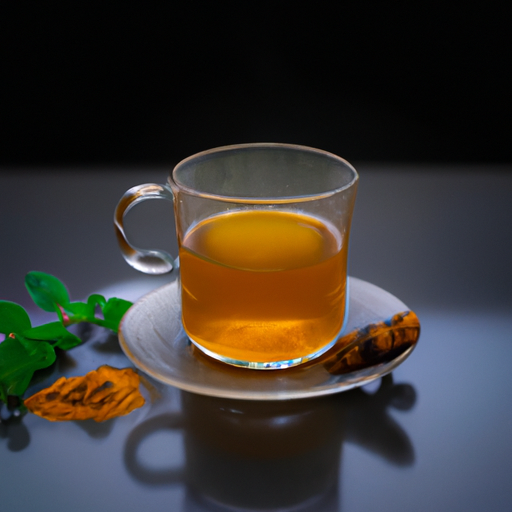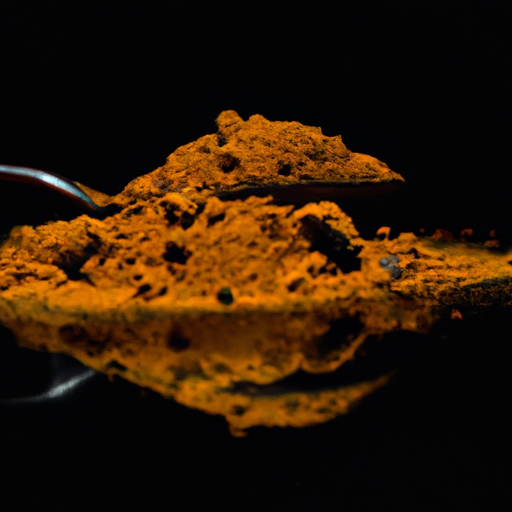Are you in search of a cozy beverage that not only pleases your palate but also offers numerous health advantages? Look to turmeric tea! This vibrant yellow, earthy spice has been utilized for centuries in ancient Ayurvedic medicine for addressing a wide array of health issues.
And now, with modern research supporting its numerous health benefits, turmeric tea has become a popular beverage choice for health-conscious individuals. Imagine sipping on a steaming cup of turmeric tea on a chilly morning, feeling the warmth spread through your body as you take in its fragrant aroma.
Not only does it provide a sense of comfort, but turmeric tea can also help reduce inflammation, boost immunity, and support digestion. So, whether you’re looking for a healthy alternative to your morning coffee or a soothing bedtime drink, turmeric tea is the perfect choice.
In this article, we’ll explore the health benefits of turmeric, how to make the perfect cup of turmeric tea, and much more.
Key Takeaways
- Turmeric can be used to make a warm and comforting tea with a unique rich, earthy flavor and vibrant golden color, and is often brewed with other spices.
- Turmeric tea has numerous health benefits, including reducing inflammation, boosting immunity, and supporting digestion, and may also have potential benefits for brain health, memory improvement, and lowering the risk of chronic diseases.
- In addition to drinking turmeric tea, turmeric can also be incorporated into cooking, such as adding it to soups, stews, and curries.
- Turmeric supplements are a convenient and effective way to increase daily intake of curcumin, the active compound in turmeric, and can also be used topically to reduce redness, acne, signs of aging, brighten and even out skin tone, and have powerful anti-inflammatory and antimicrobial properties. It is important to consult a healthcare provider before incorporating turmeric into one’s diet or adding supplements.
What is Turmeric Tea?
Turmeric tea is a delicious and healthy drink made by infusing turmeric in hot water. It’s a popular herbal tea that has been consumed for centuries in many countries, particularly in India and other parts of Asia. The tea is often brewed with other spices such as ginger, cinnamon, and black pepper to enhance its flavor and health benefits.
Compared to other herbal teas, turmeric tea is unique because of its rich, earthy flavor and vibrant golden color. It’s also known for its numerous health benefits, such as reducing inflammation, boosting the immune system, and aiding in digestion.
There are many different recipes for turmeric tea, including simple ones that only require turmeric and hot water, and more complex ones that involve adding honey, lemon, and other spices. With so many benefits and recipes to choose from, turmeric tea is a great addition to any healthy diet.
Now, let’s explore the health benefits of turmeric in more detail.
Health Benefits of Turmeric
You’ll be happy to know that turmeric offers a number of significant health benefits. Its anti-inflammatory properties can help reduce pain and swelling, while its antioxidant properties can protect your cells from damage caused by free radicals.
Additionally, research suggests that turmeric might have potential benefits for brain health. It could improve memory and reduce the risk of Alzheimer’s disease.
Anti-inflammatory Properties
Did you know that incorporating turmeric into your tea may potentially reduce inflammation in your body? Studies have shown that the active compound in turmeric, curcumin, has potent anti-inflammatory properties that may benefit various health conditions.
Anti-inflammatory properties are important because inflammation is a key factor in many chronic diseases, including heart disease, diabetes, and cancer. By reducing inflammation, turmeric may help improve symptoms and prevent the development of these conditions. In addition, turmeric’s anti-inflammatory effects may also benefit those with arthritis, as it has been shown to reduce joint pain and stiffness.
With all of these potential benefits, adding turmeric to your tea can be a simple and effective way to improve your health. In fact, turmeric’s anti-inflammatory properties are just the beginning. Did you also know that turmeric is a powerful antioxidant?
Keep reading to learn more about how this spice can benefit your health.
Antioxidant Properties
Incorporating this spice into your diet may potentially provide numerous benefits for your health, including its powerful antioxidant properties. Turmeric contains compounds called curcuminoids, which have been shown to have potent antioxidant effects. These compounds help to neutralize harmful free radicals in your body, which can contribute to oxidative stress and damage to your cells.
Here are five ways that incorporating turmeric into your diet can benefit your health:
- Boosts your immune system
- Reduces inflammation in your body
- Helps to improve digestion
- May lower your risk of certain chronic diseases
- Has been shown to have anti-cancer properties
Turmeric supplements are available, but it’s also easy to start cooking with turmeric. Incorporating this spice into your meals can add a flavorful and healthy twist to your dishes.
In the next section, we’ll explore the potential benefits for brain health.
Potential Benefits for Brain Health
If you’re looking for ways to boost your brain health, have you considered trying out some new recipes that feature this powerful spice? Turmeric has been shown to have brain-boosting benefits, including potential memory enhancement.
In fact, a study published in the Journal of Psychopharmacology found that a daily dose of curcumin, a compound found in turmeric, improved memory and attention in healthy older adults. Turmeric’s brain-boosting benefits may be due to its anti-inflammatory and antioxidant properties.
Inflammation in the brain has been linked to a number of neurological disorders, including Alzheimer’s disease and Parkinson’s disease. Turmeric’s ability to reduce inflammation may help protect the brain from damage and improve cognitive function.
So, if you’re looking for a natural way to support your brain health, adding turmeric to your diet may be worth considering. Now, let’s explore how to make turmeric tea.
How to Make Turmeric Tea
To brew a delicious cup of turmeric tea, start by combining grated or powdered turmeric with hot water and your choice of sweetener. Turmeric can be used to make a variety of tea blends, including turmeric latte and turmeric ginger tea.
Simply add a teaspoon or two of turmeric to your favorite tea blend or create your own custom blend by combining turmeric with other ingredients like ginger, cinnamon, or black pepper.
To make the perfect cup of turmeric tea, be sure to use high-quality ingredients and experiment with different flavor combinations. It’s also important to steep the tea for the right amount of time, usually around 5-10 minutes, and to use hot, but not boiling water to prevent bitterness.
With a little experimentation and some creativity, you can create a delicious and healthy cup of turmeric tea that will leave you feeling refreshed and energized.
Tips for Brewing the Perfect Cup
Brewing a perfect cup of turmeric tea is an art that requires patience and attention to detail, but the end result is worth every effort.
There are different brewing techniques you can use to achieve the perfect cup. One way is to simmer grated or powdered turmeric root with black pepper in water for 10 minutes, then strain and add honey or lemon to taste.
Another way is to steep turmeric tea bags in hot water for 5-10 minutes. You can also experiment with adding other herbs and spices to create different tea variations.
To ensure the best flavor and health benefits, it’s important to use high-quality turmeric and fresh ingredients. You can also adjust the brewing time and temperature to suit your taste preferences.
For example, a longer steep time can result in a stronger flavor, while a shorter steep time can produce a milder taste. With these tips in mind, you can brew the perfect cup of turmeric tea to enjoy any time of day.
Speaking of which, let’s explore how to make turmeric tea for different times of day.
Turmeric Tea for Different Times of Day
If you’re looking to add some variety to your tea routine, turmeric tea may be just the thing. It not only has a slightly spicy and earthy flavor, but it also boasts numerous health benefits.
Depending on the time of day and your personal preferences, you can enjoy turmeric tea as a morning brew, afternoon treat, or bedtime soother.
Adjust the paragraph structure in the Input to logically group complete sentences on their own lines, with a double new line after. Use contractions.
Morning Brews
You can spice up your morning routine by adding turmeric to your tea. Turmeric tea is a great way to start your day. It is rich in antioxidants and anti-inflammatory properties that can help you feel energized and refreshed. You can also mix turmeric with other ingredients to create a unique and delicious herbal tea blend that can provide additional health benefits.
Here is a table to help you choose the best alternative morning beverages or herbal tea blends that incorporate turmeric:
| Morning Brews | Recipe |
|---|---|
| Turmeric Ginger Tea | Mix 1 tsp of turmeric powder and 1 tsp of grated ginger in a cup of hot water. Add honey and lemon to taste. |
| Golden Milk Tea | Mix 1 tsp of turmeric powder, 1 tsp of cinnamon, and a pinch of black pepper in a cup of warm milk. Add honey to taste. |
| Turmeric Green Tea | Brew green tea and add 1 tsp of turmeric powder. Add honey and lemon to taste. |
As you sip on your turmeric-infused tea, you can start planning for your afternoon treats.
Afternoon Treats
Indulge in some delicious snacks to treat yourself during your afternoon slump. Afternoon snacks and tea time indulgences can be the perfect pick-me-up to get you through the rest of your day.
Turmeric tea is a great choice for an afternoon beverage, as it’s not only delicious, but also has potential health benefits. Turmeric is known for its anti-inflammatory properties and may help reduce the risk of chronic diseases such as heart disease and cancer. It also contains antioxidants which can help protect the body from free radicals that can cause damage to cells. Adding a pinch of black pepper to your turmeric tea can also increase the bioavailability of certain compounds, making them easier for your body to absorb.
So, why not try making a delicious cup of turmeric tea to accompany your afternoon snack and reap the potential health benefits?
Transitioning into the subsequent section about ‘bedtime soothers’, winding down at the end of the day is just as important as keeping yourself energized during the day. So, let’s take a look at some bedtime soothers to help you relax and prepare for a good night’s sleep.
Bedtime Soothers
As you wind down for the night, consider adding herbal alternatives to your routine to help you unwind and relax. Chamomile tea, passionflower, and valerian root are all well-known herbs for promoting relaxation and sleep. You can brew these herbs into a warm cup of tea or take them in supplement form.
Another option is to incorporate relaxation techniques such as deep breathing, meditation, or gentle yoga stretches. These practices can help calm your mind and ease any tension in your body, making it easier to fall asleep.
By combining these techniques with herbal alternatives, you can create a bedtime routine that promotes restful sleep and optimal health.
Now, let’s explore potential side effects and precautions to be aware of when using herbal remedies.
Potential Side Effects and Precautions
Be aware of potential side effects and take precautions when using turmeric in tea. Although turmeric is generally considered safe, consuming large amounts of it may cause gastrointestinal issues such as nausea and diarrhea. Taking high doses of turmeric supplements over a long period of time may also lead to liver damage.
In addition, some individuals may experience allergic reactions to turmeric. Symptoms may include hives, itching, and difficulty breathing. If you experience any of these symptoms, stop consuming turmeric immediately and seek medical attention.
It’s also important to consult with your healthcare provider before incorporating turmeric into your diet, especially if you’re taking medication or have a pre-existing medical condition.
Incorporating turmeric into your diet through tea can be a healthy and delicious way to reap its many benefits, but it’s important to be aware of potential side effects and take necessary precautions. Keep in mind that turmeric dosage and individual tolerance can vary, so start with a small amount and gradually increase as needed.
Next, we’ll explore the connection between turmeric tea and weight loss.
Turmeric Tea and Weight Loss
Now that we have discussed the potential side effects and precautions of turmeric, let’s move on to the exciting topic of turmeric tea and weight loss. Turmeric tea has been gaining popularity in recent years as a natural remedy for weight loss. The active ingredient in turmeric, curcumin, has been shown to have anti-inflammatory and antioxidant properties, which can aid in weight management. Additionally, turmeric tea has been found to boost metabolism and aid in digestion, making it a great addition to any weight loss regimen.
To illustrate the potential benefits of turmeric tea for weight loss, we have created a table showcasing some of the research studies that have been conducted on the topic. As you can see, the results are promising and suggest that turmeric tea may be a useful tool for those looking to manage their weight.
| Study | Participants | Results |
|---|---|---|
| Randomized controlled trial | 44 overweight individuals | Turmeric supplementation led to a significant reduction in body weight, BMI, and waist circumference compared to placebo. |
| Animal study | Rats fed a high-fat diet | Turmeric extract decreased body weight gain and fat accumulation. |
| Systematic review and meta-analysis | Various studies | Curcumin supplementation resulted in a significant decrease in body weight, BMI, and waist circumference. |
Turmeric tea has the potential to aid in weight loss by boosting metabolism and aiding in digestion. The research studies conducted on the topic suggest that turmeric tea may be a useful tool for those looking to manage their weight. However, it is important to note that turmeric tea should not be used as a sole method for weight loss and should be used in conjunction with a healthy diet and regular exercise. Moving forward, let’s explore other ways to enjoy turmeric.
Other Ways to Enjoy Turmeric
If you enjoy the taste of turmeric, there are a variety of ways to incorporate it into your diet beyond just drinking turmeric tea. You can add it to soups, stews, and curries for a flavorful and healthy boost. Turmeric supplements and capsules are also available for those who want to take advantage of its potential health benefits.
Topical applications are also an option for those looking to use turmeric for skincare purposes. It is generally recommended to consume no more than three cups of turmeric tea per day. And for those concerned about caffeine, rest assured that turmeric tea is naturally caffeine-free.
Culinary Uses
You can easily add a pinch of turmeric to your tea to give it a warm and spicy flavor. As the adage goes, "a pinch of spice can make everything nice."Turmeric has been used in cooking for centuries and is a staple in many cuisines around the world.
Turmeric in recipes is often used as a natural food coloring and as a spice to add flavor to dishes such as curries, stews, and soups. It pairs well with other spices like cumin, coriander, and ginger, and can be used in both sweet and savory dishes.
Turmeric in drinks is also becoming increasingly popular due to its many health benefits. You can make a turmeric latte, also known as golden milk, by adding turmeric, milk, honey, and other spices to a cup of warm milk. This drink is said to help with digestion, reduce inflammation, and boost the immune system. However, if you’re not a fan of the taste of turmeric, you can also take it in supplement or capsule form.
Supplements and Capsules
Consider adding turmeric supplements or capsules to your daily routine to experience the numerous health benefits this spice has to offer. Turmeric supplements are a convenient and effective way to increase your daily intake of curcumin, the active compound in turmeric that has powerful anti-inflammatory and antioxidant properties.
Here are some benefits of taking turmeric supplements or capsules:
-
Reduce inflammation: Curcumin has been shown to effectively reduce inflammation in the body, which can help alleviate symptoms of conditions such as arthritis and irritable bowel syndrome.
-
Boost brain function: Studies have found that curcumin can improve cognitive function and reduce the risk of Alzheimer’s disease.
-
Improve heart health: Curcumin has been shown to lower cholesterol levels and improve blood vessel function, which can reduce the risk of heart disease.
-
Fight cancer: Some studies have suggested that curcumin may have anti-cancer properties and could potentially help prevent or treat certain types of cancer.
Incorporating turmeric supplements or capsules into your daily routine can have numerous benefits for your health. However, if you’re currently taking any medications or have any underlying health conditions, it’s important to consult with your healthcare provider before adding any new supplements to your regimen. Next, we’ll explore the benefits of using turmeric topically.
Topical Applications
Exploring the benefits of using turmeric topically is like unlocking a treasure trove of natural skincare remedies that can leave your skin looking radiant and refreshed. Turmeric has been used for centuries in traditional Ayurvedic medicine for its powerful anti-inflammatory and antimicrobial properties, making it a popular ingredient in DIY turmeric face mask recipes. Topical application of turmeric can help reduce redness, acne, and signs of aging, while also brightening and evening out your skin tone.
To help you get started on your turmeric skincare journey, here are some popular DIY turmeric face mask recipes to try:
| Recipe | Ingredients | Benefits |
|---|---|---|
| Turmeric Honey Mask | 1 tsp turmeric, 1 tbsp honey | Reduces inflammation and hydrates skin |
| Turmeric Yogurt Mask | 1 tsp turmeric, 1 tbsp plain yogurt | Brightens and evens out skin tone |
| Turmeric Lemon Mask | 1 tsp turmeric, 1 tbsp lemon juice | Reduces acne and dark spots |
Incorporating turmeric topically into your skincare routine can be a game-changer for your complexion. But remember, as with any new skincare product, it’s important to patch test first and start with a small amount to avoid any potential irritation.
Now that you’ve learned about the topical benefits of turmeric, let’s move on to the next step: how much turmeric tea should you drink?
How much turmeric tea should I drink?
Get ready to experience the amazing health benefits of turmeric by finding out the perfect amount of this golden spice to add to your daily routine! When it comes to turmeric tea, the recommended dosage varies depending on your age, health condition, and the desired effect you want to achieve.
As a general rule, it’s safe to consume up to 3 grams of turmeric per day, which is approximately 1 teaspoon of ground turmeric powder or 2-3 tablespoons of fresh turmeric root. When it comes to turmeric tea frequency, you can drink it every day as long as you don’t exceed the recommended dosage.
However, it’s always best to consult your doctor or a healthcare professional before adding any new supplement or herbal remedy to your diet, especially if you’re pregnant, breastfeeding, or have a medical condition. Now that you know the perfect amount of turmeric to add to your tea, let’s explore the next question: does turmeric tea have caffeine?
Does turmeric tea have caffeine?
Wondering if your cup of golden brew contains caffeine? The answer is no. Turmeric tea is naturally caffeine-free, which makes it an ideal beverage to enjoy throughout the day without worrying about the negative effects of caffeine.
Unlike other herbal teas, such as green tea or black tea, turmeric tea is not derived from the Camellia sinensis plant, which contains caffeine. In fact, turmeric tea can be a great alternative to other caffeinated beverages, especially for those who are sensitive to caffeine or looking to reduce their caffeine intake.
Turmeric tea has a warm and soothing flavor, with a subtle spiciness that comes from the active ingredient curcumin. So, if you’re looking for a caffeine-free beverage that offers a range of health benefits, turmeric tea is definitely worth a try.
Now, let’s move on to the next question: can you drink turmeric tea while pregnant?
Can I drink turmeric tea while pregnant?
If you’re expecting, it’s important to know if turmeric-infused drinks are safe to consume. Turmeric tea, in particular, has been said to have numerous health benefits, including reducing inflammation and promoting healthy digestion. However, the safety of consuming turmeric tea during pregnancy is still being studied.
While there is limited research on the effects of turmeric tea on pregnancy, some studies suggest that it may be safe to consume in moderate amounts. In fact, turmeric is often used in traditional medicine to treat various pregnancy-related issues, such as morning sickness and inflammation. However, it’s important to speak with your healthcare provider before adding turmeric tea to your diet, as they can advise you on the appropriate dosage and whether it’s safe for you and your baby.
Overall, drinking turmeric tea in moderation may provide certain benefits during pregnancy, but it’s always best to consult with your healthcare provider first.
Frequently Asked Questions
Can turmeric tea be consumed by pregnant or breastfeeding women?
Turmeric tea benefits pregnant women and nursing mothers, but it’s important to consult with a healthcare provider first. Recipes for turmeric tea include adding honey and ginger for added flavor. It’s a natural way to support overall health during this special time.
How much turmeric should be added to make a cup of turmeric tea?
To make a cup of turmeric tea, add 1-2 teaspoons of turmeric powder to boiling water and simmer for 10 minutes. Enhance the flavor by adding ginger and honey. Ginger also provides added health benefits such as reducing inflammation.
Can turmeric tea be consumed on an empty stomach?
Yes, turmeric tea can be consumed on an empty stomach. The benefits of turmeric tea include reducing inflammation and aiding digestion. To prepare, boil water, add turmeric and other spices, and steep for 5-10 minutes. Enjoy hot or cold.
Is it safe to consume turmeric tea along with medication?
When consuming turmeric tea, be cautious of potential interactions with medication. Certain drugs, such as blood thinners, can have adverse side effects when mixed with turmeric. Always consult with your healthcare provider before adding turmeric tea to your diet.
Does the type of turmeric used affect the health benefits of turmeric tea?
When it comes to the health benefits of turmeric tea, the type of turmeric used can make a difference. Turmeric varieties vary in their levels of curcumin, the active ingredient. Cooking with turmeric also showcases its versatility. Health benefits comparison can vary between turmeric varieties.
Conclusion
Congratulations! You now know how to make a delicious and healthy cup of turmeric tea. Turmeric tea is an excellent addition to your daily routine, with its numerous benefits for the body such as reducing inflammation and improving brain function.
But remember, turmeric tea is generally safe, but it’s important to be aware of potential side effects, especially if you’re taking medication or have certain health conditions. Always consult with your healthcare provider before adding turmeric tea to your diet.
So go ahead and enjoy a warm cup of turmeric tea, knowing that you’re doing something good for your body and mind. As the famous saying goes, "An ounce of prevention is worth a pound of cure."Incorporating turmeric tea into your daily routine is a simple yet impactful way to prevent health issues and promote overall wellness.










